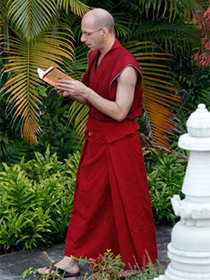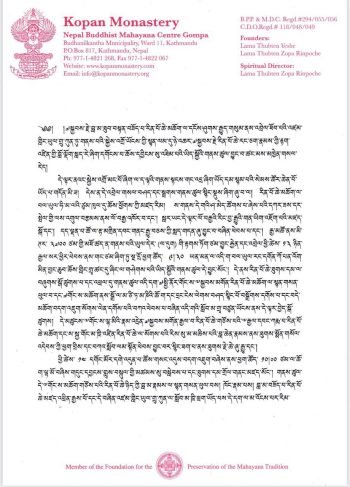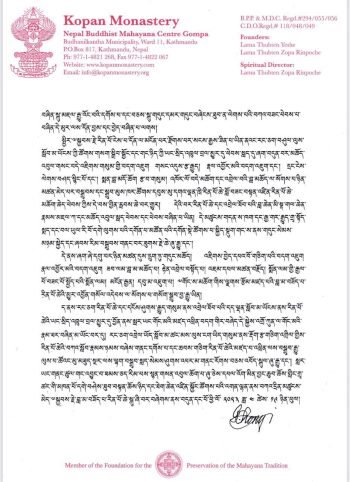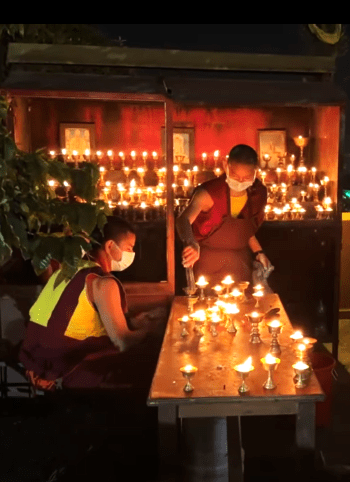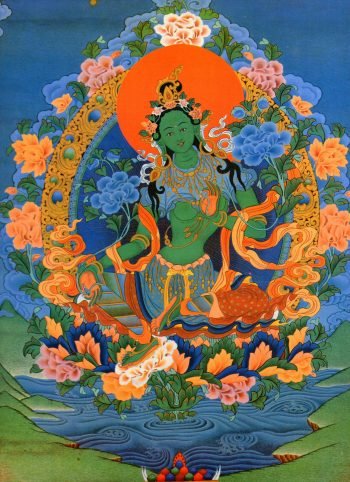- Home
- FPMT Homepage
Foundation for the Preservation of the Mahayana Tradition
The FPMT is an organization devoted to preserving and spreading Mahayana Buddhism worldwide by creating opportunities to listen, reflect, meditate, practice and actualize the unmistaken teachings of the Buddha and based on that experience spreading the Dharma to sentient beings. We provide integrated education through which people’s minds and hearts can be transformed into their highest potential for the benefit of others, inspired by an attitude of universal responsibility and service. We are committed to creating harmonious environments and helping all beings develop their full potential of infinite wisdom and compassion. Our organization is based on the Buddhist tradition of Lama Tsongkhapa of Tibet as taught to us by our founders Lama Thubten Yeshe and Lama Thubten Zopa Rinpoche.
- Willkommen
Die Stiftung zur Erhaltung der Mahayana Tradition (FPMT) ist eine Organisation, die sich weltweit für die Erhaltung und Verbreitung des Mahayana-Buddhismus einsetzt, indem sie Möglichkeiten schafft, den makellosen Lehren des Buddha zuzuhören, über sie zur reflektieren und zu meditieren und auf der Grundlage dieser Erfahrung das Dharma unter den Lebewesen zu verbreiten.
Wir bieten integrierte Schulungswege an, durch denen der Geist und das Herz der Menschen in ihr höchstes Potential verwandelt werden zum Wohl der anderen – inspiriert durch eine Haltung der universellen Verantwortung und dem Wunsch zu dienen. Wir haben uns verpflichtet, harmonische Umgebungen zu schaffen und allen Wesen zu helfen, ihr volles Potenzial unendlicher Weisheit und grenzenlosen Mitgefühls zu verwirklichen.
Unsere Organisation basiert auf der buddhistischen Tradition von Lama Tsongkhapa von Tibet, so wie sie uns von unseren Gründern Lama Thubten Yeshe und Lama Thubten Zopa Rinpoche gelehrt wird.
- Bienvenidos
La Fundación para la preservación de la tradición Mahayana (FPMT) es una organización que se dedica a preservar y difundir el budismo Mahayana en todo el mundo, creando oportunidades para escuchar, reflexionar, meditar, practicar y actualizar las enseñanzas inconfundibles de Buda y en base a esa experiencia difundir el Dharma a los seres.
Proporcionamos una educación integrada a través de la cual las mentes y los corazones de las personas se pueden transformar en su mayor potencial para el beneficio de los demás, inspirados por una actitud de responsabilidad y servicio universales. Estamos comprometidos a crear ambientes armoniosos y ayudar a todos los seres a desarrollar todo su potencial de infinita sabiduría y compasión.
Nuestra organización se basa en la tradición budista de Lama Tsongkhapa del Tíbet como nos lo enseñaron nuestros fundadores Lama Thubten Yeshe y Lama Zopa Rinpoche.
A continuación puede ver una lista de los centros y sus páginas web en su lengua preferida.
- Bienvenue
L’organisation de la FPMT a pour vocation la préservation et la diffusion du bouddhisme du mahayana dans le monde entier. Elle offre l’opportunité d’écouter, de réfléchir, de méditer, de pratiquer et de réaliser les enseignements excellents du Bouddha, pour ensuite transmettre le Dharma à tous les êtres. Nous proposons une formation intégrée grâce à laquelle le cœur et l’esprit de chacun peuvent accomplir leur potentiel le plus élevé pour le bien d’autrui, inspirés par le sens du service et une responsabilité universelle. Nous nous engageons à créer un environnement harmonieux et à aider tous les êtres à épanouir leur potentiel illimité de compassion et de sagesse. Notre organisation s’appuie sur la tradition guéloukpa de Lama Tsongkhapa du Tibet, telle qu’elle a été enseignée par nos fondateurs Lama Thoubtèn Yéshé et Lama Zopa Rinpoché.
Visitez le site de notre Editions Mahayana pour les traductions, conseils et nouvelles du Bureau international en français.
Voici une liste de centres et de leurs sites dans votre langue préférée
- Benvenuto
L’FPMT è un organizzazione il cui scopo è preservare e diffondere il Buddhismo Mahayana nel mondo, creando occasioni di ascolto, riflessione, meditazione e pratica dei perfetti insegnamenti del Buddha, al fine di attualizzare e diffondere il Dharma fra tutti gli esseri senzienti.
Offriamo un’educazione integrata, che può trasformare la mente e i cuori delle persone nel loro massimo potenziale, per il beneficio di tutti gli esseri, ispirati da un’attitudine di responsabilità universale e di servizio.
Il nostro obiettivo è quello di creare contesti armoniosi e aiutare tutti gli esseri a sviluppare in modo completo le proprie potenzialità di infinita saggezza e compassione.
La nostra organizzazione si basa sulla tradizione buddhista di Lama Tsongkhapa del Tibet, così come ci è stata insegnata dai nostri fondatori Lama Thubten Yeshe e Lama Zopa Rinpoche.
Di seguito potete trovare un elenco dei centri e dei loro siti nella lingua da voi prescelta.
- 欢迎 / 歡迎
简体中文
“护持大乘法脉基金会”( 英文简称:FPMT。全名:Foundation for the Preservation of the Mahayana Tradition) 是一个致力于护持和弘扬大乘佛法的国际佛教组织。我们提供听闻,思维,禅修,修行和实证佛陀无误教法的机会,以便让一切众生都能够享受佛法的指引和滋润。
我们全力创造和谐融洽的环境, 为人们提供解行并重的完整佛法教育,以便启发内在的环宇悲心及责任心,并开发内心所蕴藏的巨大潜能 — 无限的智慧与悲心 — 以便利益和服务一切有情。
FPMT的创办人是图腾耶喜喇嘛和喇嘛梭巴仁波切。我们所修习的是由两位上师所教导的,西藏喀巴大师的佛法传承。
繁體中文
護持大乘法脈基金會”( 英文簡稱:FPMT。全名:Found
ation for the Preservation of the Mahayana Tradition ) 是一個致力於護持和弘揚大乘佛法的國際佛教組織。我們提供聽聞, 思維,禪修,修行和實證佛陀無誤教法的機會,以便讓一切眾生都能 夠享受佛法的指引和滋潤。 我們全力創造和諧融洽的環境,
為人們提供解行並重的完整佛法教育,以便啟發內在的環宇悲心及責 任心,並開發內心所蘊藏的巨大潛能 — 無限的智慧與悲心 – – 以便利益和服務一切有情。 FPMT的創辦人是圖騰耶喜喇嘛和喇嘛梭巴仁波切。
我們所修習的是由兩位上師所教導的,西藏喀巴大師的佛法傳承。 察看道场信息:
- FPMT Homepage
- News/Media
-
- Study & Practice
-
-
- About FPMT Education Services
- Latest News
- Programs
- New to Buddhism?
- Buddhist Mind Science: Activating Your Potential
- Heart Advice for Death and Dying
- Discovering Buddhism
- Living in the Path
- Exploring Buddhism
- FPMT Basic Program
- FPMT Masters Program
- FPMT In-Depth Meditation Training
- Maitripa College
- Lotsawa Rinchen Zangpo Translator Program
- Universal Education for Compassion & Wisdom
- Online Learning Center
-
- Prayers & Practice Materials
- Overview of Prayers & Practices
- Full Catalogue of Prayers & Practice Materials
- Explore Popular Topics
- Benefiting Animals
- Chenrezig Resources
- Death & Dying Resources
- Lama Chopa (Guru Puja)
- Lama Zopa Rinpoche: Compendium of Precious Instructions
- Lama Zopa Rinpoche: Life Practice Advice
- Lama Zopa Rinpoche Practice Series
- Lamrim Resources
- Mantras
- Prayer Book Updates
- Purification Practices
- Sutras
- Thought Transformation (Lojong)
- Audio Materials
- Dharma Dates - Tibetan Calendar
- Translation Services
- Publishing Services
- Ways to Offer Support
- Prayers & Practice Materials
-
- Teachings and Advice
- Find Teachings and Advice
- Lama Zopa Rinpoche Advice Page
- Lama Zopa Rinpoche: Compendium of Precious Instructions
- Lama Zopa Rinpoche Video Teachings
- ༧སྐྱབས་རྗེ་བཟོད་པ་རིན་པོ་ཆེ་མཆོག་ནས་སྩལ་བའི་བཀའ་སློབ་བརྙན་འཕྲིན།
- Podcasts
- Lama Yeshe Wisdom Archive
- Buddhism FAQ
- Dharma for Young People
- Resources on Holy Objects
- Teachings and Advice
-
-
*If a menu item has a submenu clicking once will expand the menu clicking twice will open the page.
-
-
- Centers
-
- Teachers
-
- Projects
-
-
-
-
*If a menu item has a submenu clicking once will expand the menu clicking twice will open the page.
-
-
- FPMT
-
-
-
-
-
Superficial observation of the sense world might lead you to believe that people’s problems are different, but if you check more deeply, you will see that fundamentally, they are the same. What makes people’s problems appear unique is their different interpretation of their experiences.
Lama Thubten Yeshe
-
-
-
- Shop
-
-
-
The Foundation Store is FPMT’s online shop and features a vast selection of Buddhist study and practice materials written or recommended by our lineage gurus. These items include homestudy programs, prayers and practices in PDF or eBook format, materials for children, and other resources to support practitioners.
Items displayed in the shop are made available for Dharma practice and educational purposes, and never for the purpose of profiting from their sale. Please read FPMT Foundation Store Policy Regarding Dharma Items for more information.
-
-
FPMT Community: Stories & News
24
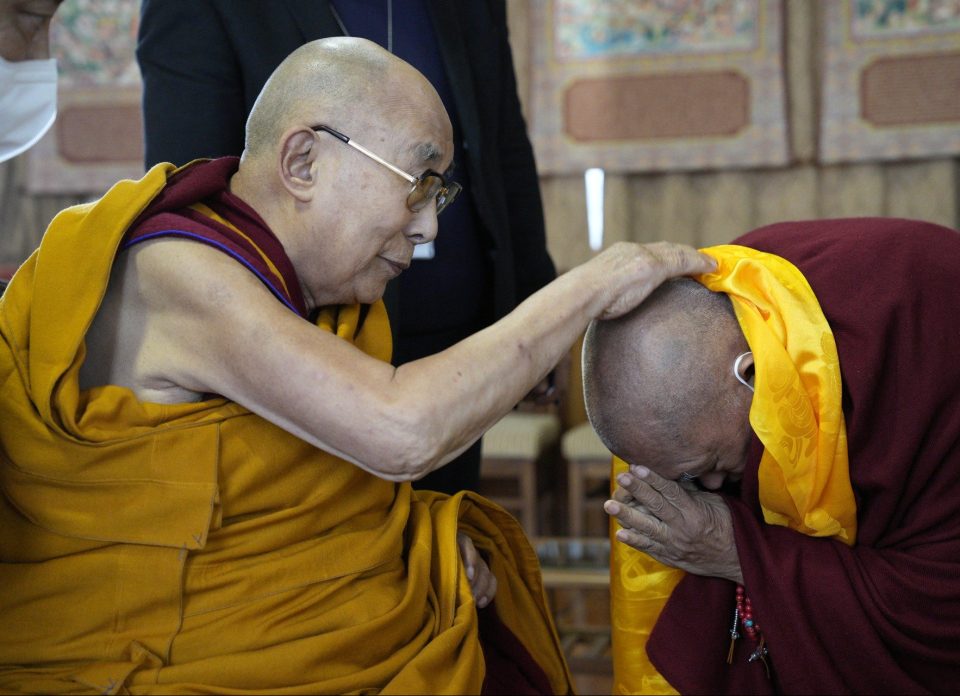
Lama Zopa Rinpoche meeting with His Holiness the Dalai Lama in Bodhgaya, India, January, 2023. Photo courtesy of the Office of His Holiness the Dalai Lama.
Words of Praise to His Holiness the Dalai Lama from Lama Zopa Rinpoche
Your Holiness,
Your example of morality in not harming but only benefiting sentient beings is incomparable in this universe.
Your compassion is the source of all sentient beings’ development of the good heart.
Your power is the source of all sentient beings’ happiness and peace.
Your wisdom is the source of all sentient beings’ hope and of opening the Dharma wisdom eye, of learning to discriminate what is right, which is to be practiced, and what is wrong, which is to be abandoned.
If you are not the actual Compassionate-eyed Buddha, there is no other compassionate Buddha guiding us sentient beings.
To you, the wish-granting jewel, embodiment of all the merit field, devotedly with body, speech and mind, I, the students of FPMT and all sentient beings pay homage forever and seek your guidance forever.
Words from the late Lama Zopa Rinpoche, 2022.
FPMT Statement in Support of His Holiness the Dalai Lama
We are deeply saddened by some of the recent media coverage of a short video clip of His Holiness the 14th Dalai Lama with a young boy interacting with His Holiness during a public event on February 28, 2023.
His Holiness has worked solely and tirelessly for the welfare and benefit of others. His profound spiritual teachings, combined with his warm and affectionate communication style, are a source of deeply precious inspiration.
For Buddhists and non-Buddhists alike, His Holiness is the embodiment of compassion, non-violence, selflessness, and wisdom.
His Holiness the Dalai Lama has been and remains the greatest source of inspiration for the Foundation for the Preservation of the Mahayana Tradition (FPMT).
We share the feelings of sadness and frustration with all those who have been affected by the recent allegations, which are based on an intentionally edited video clip and a lack of understanding of the Tibetan language and culture.
We are also in agreement with the recent statement made by His Eminence Ling Rinpoche on this subject.
His Holiness continues to be a beacon of hope and peace in the world, and for the FPMT organization. We pray for His Holiness’s long life and for the fulfilment of all his wishes.
Foundation for the Preservation of Mahayana Tradition (FPMT), is a Tibetan Buddhist organization dedicated to the transmission of the Mahayana Buddhist tradition and values worldwide through teaching, meditation and community service.
- Tagged: his holiness the dalai lama
20
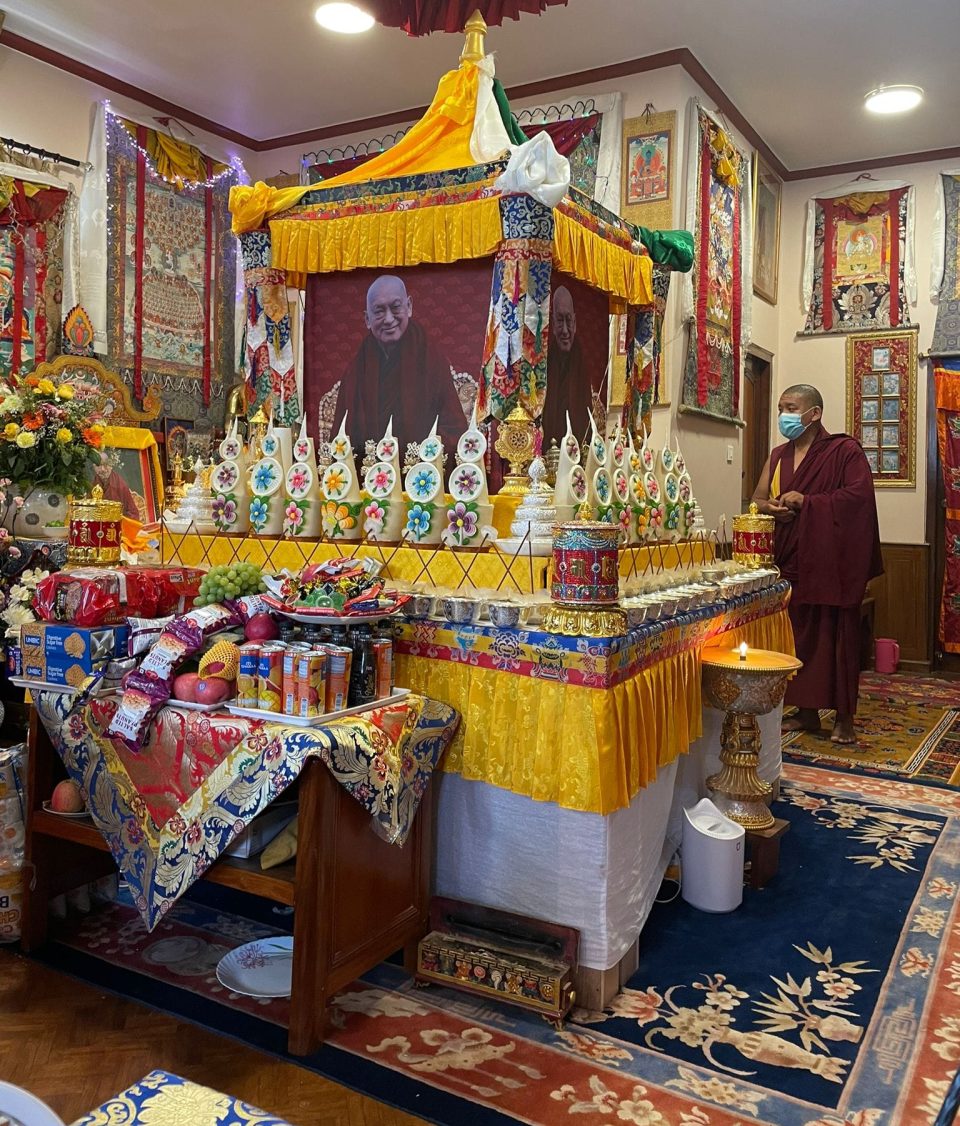
Prayers continue 24 hours a day in front of Lama Zopa Rinpoche’s holy body, and also on every inch of Kopan Monastery.
We’re pleased to share this letter from Khenrinpoche Geshe Chonyi, Abbot of Kopan Monastery and member of the FPMT Inc. board. Khenrinpoche has sent this letter, in Tibetan, English, and Chinese for those with a connection to Lama Zopa Rinpoche, on the sad occasion of the seven days since Rinpoche’s passing.
As everyone knows, Kyabje Lama Zopa Rinpoche, in order to free us from the grasping at permanence, has taken the aspect of passing into parinirvana. Undoubtedly, many are deeply concerned and wondering what is happening now. Therefore, I would like to briefly explain the current situation.
Kyabje Lama Zopa Rinpoche was invited to attend a Dharma function in the Tsum region of Nepal. There, several local groups were celebrating the one-hundredth year of declaring the Tsum Valley as a non-violence area and promoting vegetarianism, as well as their formal commitment to continue in the same way for another hundred years. Rinpoche went as requested to grace this function and bestow a Hayagriva initiation to the faithful.
The elevation of this area is 3,700 meters (12,000 feet) above sea level. Due to some signs of altitude sickness, Rinpoche decided to return to Kathmandu and Kopan Monastery earlier than planned. Around 9:30 a.m. on April 13th, sadly, Kyabje Lama Zopa Rinpoche showed the aspect of passing away here at Kopan Monastery. As soon as Rinpoche began his clear light meditation, we informed His Holiness the Dalai Lama who advised that students engage in the practice of Cittamani Tara, recitation of The Essence of Eloquence by Lama Tsonghapa, and perform the self-initiations of Heruka and other deities. Accordingly, all of the disciples and ordained sangha began these practices immediately. Likewise, we have received letters of prayer, condolence, and advice from His Holiness the Dalai Lama, His Holiness the Karmapa, His Holiness Sakya Trichen, and from various other lineage lamas. For this we express our deepest gratitude.
On April 14th, around 10:00 p.m., when monks reached the point in the Guhyasamaja sadhana of the four goddesses evoking the deity to arise from dharmakaya song, Rinpoche arose from his clear, light meditation. This was reported to His Holiness the Dalai Lama and Rinpoche’s other teachers from whom we sought guidance. They advised that, as Lama Zopa Rinpoche has done extensive deeds for the Dharma, and has thousands of disciples from all over the world, it would be good to preserve Rinpoche’s holy body in order that his many disciples can gradually come to pay respects. Therefore, we are now in the process of preserving Rinpoche’s holy body according to traditional practice.
Although in actuality, Kyabje Lama Zopa Rinpoche is already a fully enlightened buddha, in order for all of us disciples to accumulate merit and purify negativities; and for the swift return of an unmistaken reincarnation, for seven days we are performing the following prayers twenty-four hours per day: the self-initiations of Yamantaka, Guhyasamaja, and Heruka, Vajrayogini self-initiation, recitations of the Essence of Eloquence, the three root texts (The Ornament of Clear Realizations, Entrance to Middle, and Treasury of Knowledge), Medicine Buddha puja, Heruka Guru Puja, and others.
During this time, many lamas who were close to Kyabje Zopa Rinpoche and many lay people are continuously coming to pay respects and make offerings. Likewise, we offer thanks to the Great Monastic Seats of Sera, Drepung, Ganden, and the Upper and Lower Tantric Colleges, many other Gelukpa monasteries in Nepal, and other monasteries as well as lay associations who performing prayers in solidarity.
For the entire forty-nine-day period, we will perform the following prayers for twenty-four hours daily: special rituals related to preserving the holy body, Yamantaka and Vajrayogini self-initiations, Guru Puja, recitation of Praise of Dependent Origination, Chanting the Names of Manjushri, the King of Prayers, The Ornament of Clear Realizations, Entrance to Middle, and the swift return prayer composed by His Holiness the Dalai Lama.
Finally, to all faithful disciples who have a connection with Rinpoche, whether direct or indirect, I sincerely request you to come together to fulfill all of Rinpoche’s advices whole heartedly, and complete the unfinished projects that remain until the unmistaken reincarnation of Rinpoche comes and again takes responsibility to continue Rinpoche’s enlightened activities.
ln the future we’ll keep you abreast of developments as they arise.
Geshe Thubten Chonyi, Abbot of Kopan Monastery and FPMT Board Member
Please read the PDF version of Khenrinpoche’s letter:
We recently shared the schedule of current prayers and pujas happening around the clock at Kopan Monastery for Lama Zopa Rinpoche, all are welcome to join the livestream on these continual activities.
We will continue to send out updates as they become available, and these will be collected on this updates page.
Foundation for the Preservation of Mahayana Tradition (FPMT), is a Tibetan Buddhist organization dedicated to the transmission of the Mahayana Buddhist tradition and values worldwide through teaching, meditation and community service.
- Tagged: fpmt board, his holiness the dalai lama, khen rinpoche geshe chonyi, kopan monastery, lama zopa rinpoche tsum, swift return prayers
18
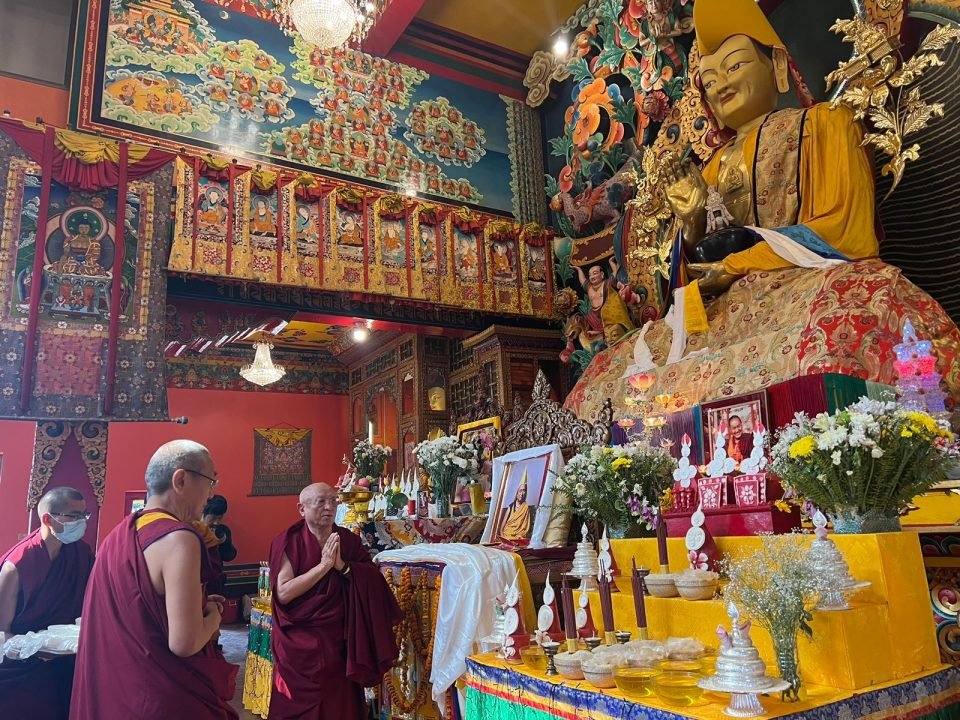
Khenrinpoche Thubten Chonyi and Chokyi Nyima Rinpoche at Kopan Monastery amidst the continual offering of prayers for Lama Zopa Rinpoche’s swift return. April 18, 2023. Photo by Kopan Monastery School.
Continued Prayers for Lama Zopa Rinpoche’s Swift Return
Prayers and pujas are continuing twenty-four hours a day at Kopan Monastery in front of Rinpoche’s holy body and also in the gompa for Lama Zopa Rinpoche’s swift return. Monasteries, nunneries and FPMT centers around the world also continue with prayers and pujas.
“Every inch of Kopan is in prayers around the clock,” as reported from the monastery. We are pleased to continue to share the livestream of prayers happening (with occasional breaks). You will find it to be much better quality than the stream we offered initially, and all are invited to connect with what is being done at Kopan in this way: https://www.youtube.com/c/fpmtinc/live
Chokyi Nyima Rinpoche, a Nyingma lama very close to Lama Zopa Rinpoche, visited Kopan this morning, joining the prayers in Rinpoche’s room. You can read Chokyi Nyima’s heartfelt letter written upon receiving the news of Rinpoche’s passing. We are happy to share this short video of the prayers happening today, joined by Chokyi Nyima Rinpoche:
https://youtube.com/shorts/J0eBjsY3j2g?feature=share
Tenzin Osel Hita is at Kopan and spoke to students gathered today. Ganden Tri Rinpoche, head of the Gelug school of Tibetan Buddhism, arrived at Kopan today.
This is the current schedule of daily prayers and pujas being offered and livestreamed, according to the local time in Nepal:
- 5:00 a.m. to 9:00 a.m. Dung Choe practice by senior Sangha
- 9:00 a.m. to 4:00 p.m. Yamantaka Solitary Hero Self-Initiation
- 4:30 p.m. to 6:30 p.m. various practices (Lamrim Meditation, Tendrel Toepa (In Praise of Dependent Origination), Calling Guru from Afar, Prayers for the Swift Return of Lama Zopa Rinpoche by international students)
- 7:30 p.m. to 1:00 a.m. Vajrayogini Self-Initiation
- 1:00 a.m. to 5:00 a.m. Guru Puja, Tendrel Toepa (In Praise of Dependent Origination), Manjushri-nama-samgiti (Chanting the Names of Manjushri), King of Prayers, Abhisamayalamkara (Ornament of Clear Realizations), Mulamadhyamakakarika (Root Verses on the Middle Way), Prayers for the Swift Return of Lama Zopa Rinpoche by monks and nuns.
Every seventh day there will also be Heruka Lama Chopa with Tsog at Kopan Monastery. Those dates are: April 19 and 26; May 3, 10, 17, and 24; and May 31.
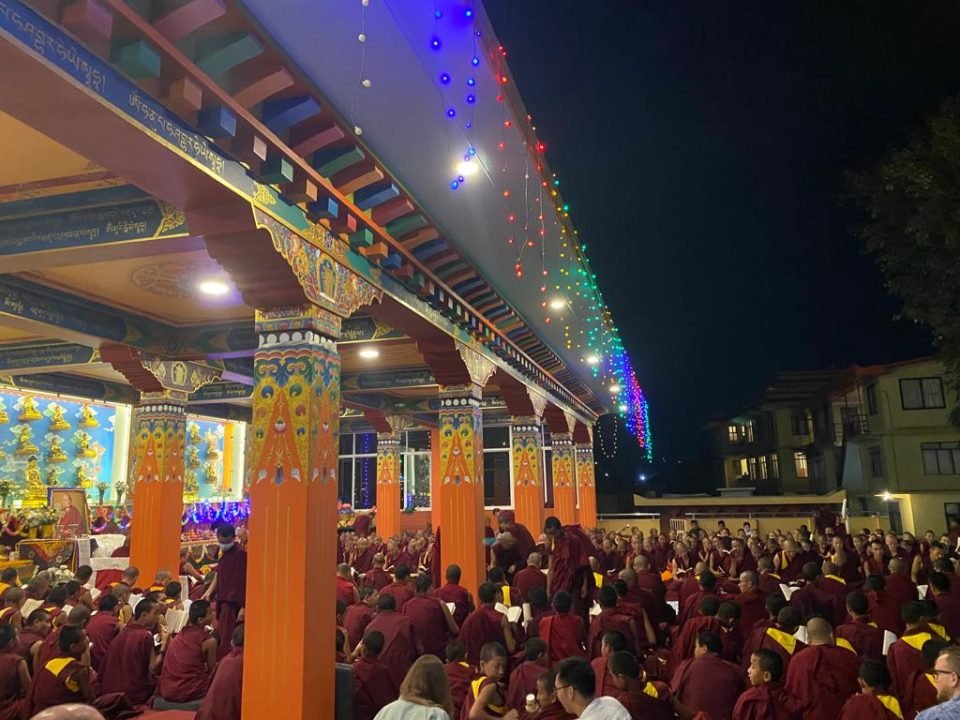
Prayers around the clock continue at Kopan Monastery for Lama Zopa Rinpoche’s swift return. Photo by Alison Murdoch.
Important Events
On the forty-ninth day after Rinpoche stopped breathing, which is May 31, Heruka Lama Chopa with Tsog will be offered at Kopan Monastery.
Before that, we have the very significant long life puja offered to His Holiness the Dalai Lama on May 24 in India. We’re hoping that many will come to this long life puja (or watch it livestreamed), as this puja will be exceptionally poignant and significant as it is a fulfilment of Rinpoche’s holy wishes.
On Khenrinpoche Geshe Chonyi’s advice, we’re planning to amend the already scheduled Light of the Path Retreat at Kopan (currently scheduled for September 3-17, 2023), and make it a month to come together for focused study and celebration of Rinpoche’s teachings, giving the opportunity to go deeper into and actualize the teachings Rinpoche has so kindly given us. We have such a wealth of teachings from Rinpoche, this will be a special opportunity to actualize them together. There will be senior FPMT registered teachers leading meditations and Khenrinpoche, Ven. Roger Kunsang, and others sharing life stories. It is likely that students will be able to come for any period of time within the Light of the Path month, depending on available accommodation at Kopan.
Details on this Light of the Path Retreat are still being worked out, but we wanted to offer these updates now so that you can have all this in mind for planning what you would be able and most like to join.
(Please note: This means that the Foundation Service Seminar that was scheduled at Kopan in September will be postponed).
Advice for FPMT Centers and Students
The following practices are suggested by Khenrinpoche Geshe Chonyi for FPMT centers and students to do at this time. These are practices to be offered as one wishes, not everything here has to be done:
- Lama Chopa and Tsog Offering – every day, or every seventh day
- Eight Verses of Thought Transformation
- In Praise of Dependent Origination translation by Thubten Jinpa | translation by Gavin Kilty
- Chanting the Names of Noble Manjushri
- King of Prayers
- Prayers for the Swift Return of Lama Zopa Rinpoche by His Holiness the 14th Dalai Lama, Tenzin Gyatso, and other distinguished lamas
Swift Return Booklet
We are delighted that so many centers and students have made quick use of the booklet containing swift return prayers for Lama Zopa Rinpoche from His Holiness the Dalai Lama, Khandro Kunga Bhuma, and others. We have made a recent update to this booklet and all are encouraged to download this most recent version: A Prayer for the Swift Return of Lama Zopa Rinpoche by His Holiness the Dalai Lama with additional prayers by other distinguished lamas
We have also added various translations as well as the standalone of His Holiness’s swift return prayer; and we are adding translations of the other prayers in the booklet as standalones as they become available.
(Please note: This collection of swift return prayers is a work in progress and updated versions of the booklet will be released. Our aim has been to make these prayers accessible as soon as they are available. Further prayers may be added to subsequent editions of the collection and edits made to existing prayers.)
News, Updates, Resources, Tributes
As a reminder, we have created the Updates Regarding Lama Zopa Rinpoche page, where all news and updates we have shared are and will be collected. On that page we’ve also added a link to translations to updates available, with our thanks to the translation services.
We have also made available a page sharing tributes and condolences from great lamas, friends, and monastery officials around the world.
From our Tributes and Condolences page we have recently added a link to an online student tribute page created by Amitabha Buddhist Centre, Singapore, for students to add their messages, tributes, and memories about Lama Zopa Rinpoche. We will share links to other online remembrance pages from FPMT centers as we receive them.
Please continue trying to fulfil Rinpoche’s holy wishes, especially to practice impermanence and bodhicitta in the context of the lamrim. Fulfilling the gurus’ holy wishes is a very important part of inviting the guru to return.
May Rinpoche be reborn as quickly as possible in a place where he can be very quickly recognized and be of most benefit to sentient beings.
Big love,
Your friends at FPMT International Office
We will continue to send out updates as they become available, and these will be collected on this updates page.
Foundation for the Preservation of Mahayana Tradition (FPMT), is a Tibetan Buddhist organization dedicated to the transmission of the Mahayana Buddhist tradition and values worldwide through teaching, meditation and community service.
16
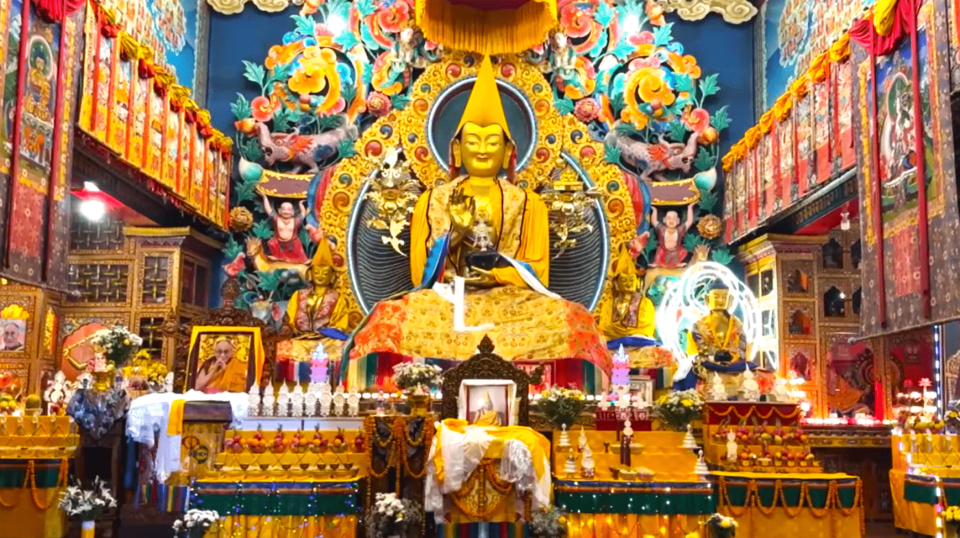
The main gompa at Kopan Monastery, April 15, 2023.
Today we share some important updates and newly available resources. Thank you for your continued prayers, offerings of support, condolences, and kindness.
The Embalming Process
The embalming process for Lama Zopa Rinpoche’s holy body has begun. We have a short video to share of the prayers taking place around Rinpoche’s holy body at the start of the embalming process.
Regarding the lamas helping to take care of the embalming of Rinpoche’s holy body, the “Nyingma lama” we referred to in yesterday’s update is one of Rinpoche’s teachers, Lama Ngawang Chokyung. We are exceptionally grateful for his guidance. Lama Ngawang Chokyung is very experienced in this method, and supervised the embalming of His Holiness Trulshik Rinpoche. The “ex-abbot of Gyumed” that we referred to is the present abbot of Segyü Dratsang, Khen Rinpoche Losang Wangdu. We are very grateful for all his care and assistance at this time.
Swift Return Prayer by His Holiness the Dalai Lama
With great rejoicing we have received a prayer which His Holiness the Dalai Lama composed for the swift return of Lama Zopa Rinpoche. This is available in English and Tibetan and has a particularly poignant colophon. For the convenience of students, we have compiled His Holiness’s prayer (starting on page 5), along with a small collection of additional prayers for Rinpoche’s swift return, composed spontaneously by other distinguished lamas with whom Rinpoche had a connection in this lifetime. It will be updated as we receive new compositions. Please download Prayer for the Swift Return of Lama Zopa Rinpoche by His Holiness the Dalai Lama with additional prayers by other distinguished lamas. This booklet is very user friendly with each prayer bookmarked and linked to from the contents page.
Prayers Offered, April 16
The following prayers are being offered today, April 16, at Kopan Monastery:
- Vajrasattva bath offering
- Thirteen Deities Yamantaka self-initiation offered by Rinpoches, Khenrinpoche, Gyumed senior monks and Kopan lama gyupas
- Extensive Medicine Buddha puja offered by general assembly of monks and nuns
- Bodhicharyavarara recitations offered by senior nuns
- All Kopan monks and nuns together with all monks of the Gelug monasteries in Nepal are gathering in the afternoon to recite prayers
- Lay devotees come in various group to make offerings and prayers
- All monks and nuns together with international students are reciting Madyamulakarika in the evening
- More pujas will continue all night
You can watch a livestream of the continued prayers and pujas at Kopan.
Tributes and Condolences
We have received many tributes to Lama Zopa Rinpoche, and messages of support and condolence, including some prayers and practices offered for Rinpoche’s swift return, from lamas and monasteries around the world. You can read these on our new Tributes and Condolences page, which we’ve added to our Updates Regarding Lama Zopa Rinpoche page.
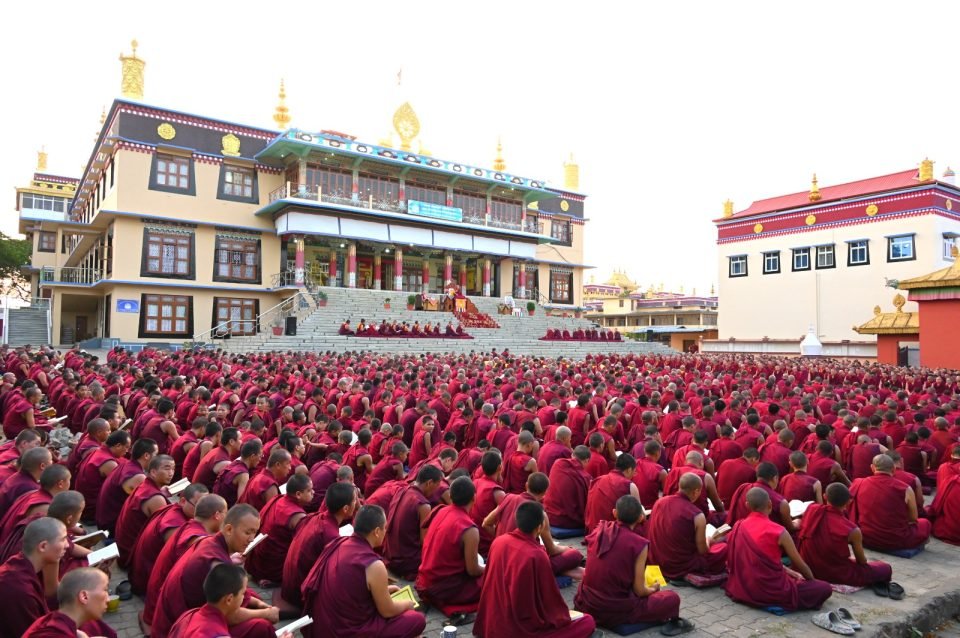
The monks of Sera Je Monastery gathering to offer prayers for the swift return of Lama Zopa Rinpoche. Photo courtesy of Sera Je Monastery.
Ongoing Practice and Dedication
Please continue trying to fulfil Rinpoche’s holy wishes, especially to practice impermanence and bodhicitta in the context of the lamrim. Fulfilling the gurus’ holy wishes is a very important part of inviting the guru to return.
May Rinpoche be reborn as quickly as possible in a place where he can be very quickly recognized and be of most benefit to sentient beings.
Big love,
Your friends at FPMT International Office
We will continue to send out updates as they become available, and these will be collected on this updates page.
Foundation for the Preservation of Mahayana Tradition (FPMT), is a Tibetan Buddhist organization dedicated to the transmission of the Mahayana Buddhist tradition and values worldwide through teaching, meditation and community service.
- Tagged: embalming process, his holiness the dalai lama, khen rinpoche losang wangdu, kopan monastery, lama ngawang chokyung, lama zopa rinpoche updates, sera je monastery, swift return prayers
15
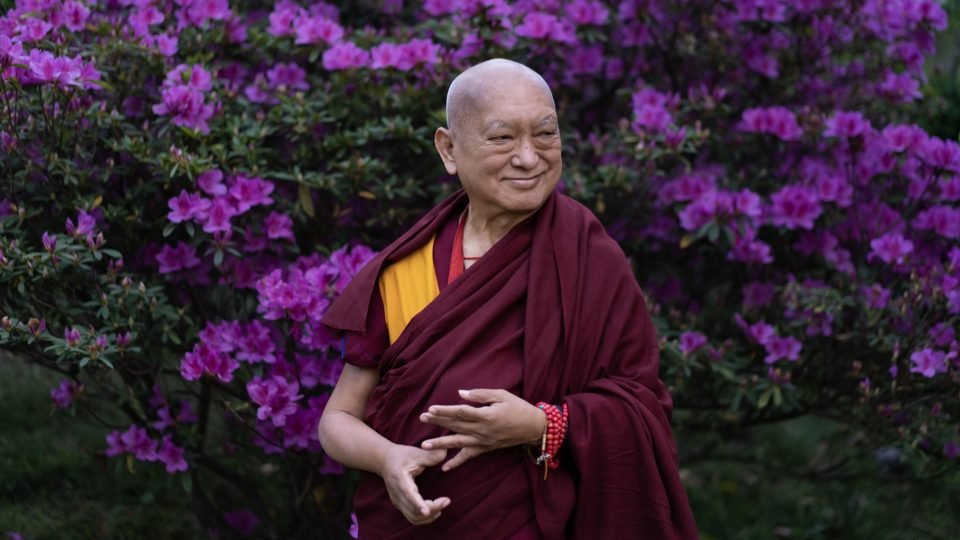
Lama Zopa Rinpoche in Nepal, March 27, 2023. Photo by Ven. Lobsang Sherab.
On April 14 at 10 p.m. Nepal time, blood came from Rinpoche’s left nostril, signaling that Rinpoche had ended his meditation.
The room was then made cold to maintain the holy body, and this morning the holy body was packed in ice.
The embalming process is the next step.
Khandro Kunga Bhuma has advised that today (April 15) is a dakini day, and that 7: 30 p.m. Nepal time today is the special time of the dakini day that fits for Rinpoche’s holy body to begin the embalming process. Khandro Kunga Bhuma will continue to take care – she is now in Nepal.
Two lamas are there who will be in charge of the embalming process, which may take several months. They are Geshe Wangdu, ex-Gyumed abbot; and a Nyingma lama (from whom Lama Zopa Rinpoche had taken transmissions), and who looked after the embalming of Trulshik Rinpoche. Ven. Roger will keep us informed about the process and timeline and we will continue to share updates on this process.
His Excellency Ling Rinpoche suggested that Rinpoche’s holy body be embalmed (rather than cremated) because Lama Zopa Rinpoche has so many students and is so widely known, as then people can come and pay their respects to Rinpoche’s holy body—it will become an object of pilgrimage at Kopan. As previously mentioned, Ven. Roger requested His Holiness the Dalai Lama to comment on this suggestion, and His Holiness advised that this is a very good way forward.
Pujas continue to go on constantly everywhere at Kopan: everyone in the monastery and nunnery is participating. The livestream of the prayers by Rinpoche’s room is continuing.
Additionally, groups are coming from other monasteries to do their own prayers in the gompa at Kopan in their own way for Rinpoche. We are making offerings to them.
Many, many monasteries are also doing pujas and prayers for Rinpoche in their own gompas. We will make offerings to them also.
Please continue trying to fulfil Rinpoche’s holy wishes, especially to practice impermanence and bodhicitta in the context of the lamrim. Fulfilling the gurus’ holy wishes is a very important part of inviting the guru to return.
We are delighted to share that we just received the swift return prayer composed by His Holiness the Dalai Lama, in Tibetan, which is downloadable from the Updates Regarding Lama Zopa Rinpoche page. We will make it available in English as soon as possible.
We are also very happy to share the swift return prayer composed by Khandro Kunga Bhuma, in Tibetan and with a quick translation into English, also now downloadable from the Updates Regarding Lama Zopa Rinpoche page.
We rejoice in the swift return prayers kindly composed by other lamas also. We will add them to the Updates Regarding Lama Zopa Rinpoche page as soon as possible.
May Rinpoche be reborn as quickly as possible in a place where he can be very quickly recognized and be of most benefit to sentient beings.
Big love,
Your friends at FPMT International Office
We will continue to send out updates as they become available, and these will be collected on this update page.
Foundation for the Preservation of Mahayana Tradition (FPMT), is a Tibetan Buddhist organization dedicated to the transmission of the Mahayana Buddhist tradition and values worldwide through teaching, meditation and community service.
- Tagged: embalming process, kopan monastery, lama zopa rinpoche final meditation, lama zopa rinpoche updates, swift return prayers
14
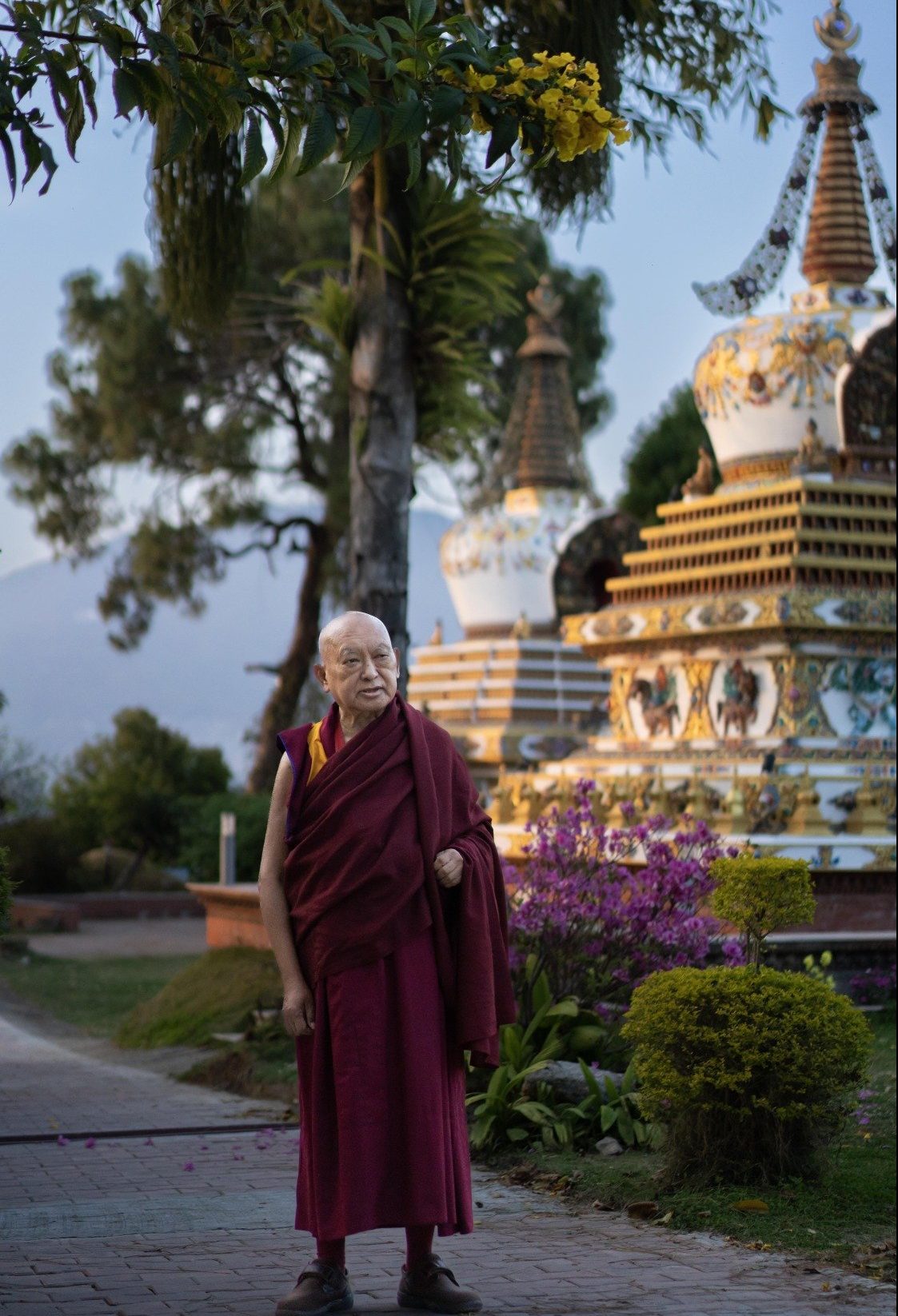
Lama Zopa Rinpoche at Kopan Monastery, March 25, 2023. Photo by Ven. Lobsang Sherab
Yesterday we shared the incredibly heart breaking news that on April 13th, Lama Zopa Rinpoche showed the aspect of passing away.
Lama Zopa Rinpoche is still in the meditation stage in his room in Kopan Monastery. A short video of Rinpoche in clear light meditation is available on Youtube if you would like to view our precious guru at this time.
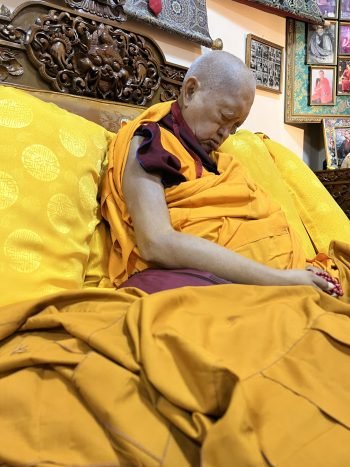
Lama Zopa Rinpoche in clear light meditation, Kopan Monastery, April 13, 2023. Photo by Ven. Roger Kunsang.
In the room next to the room where Lama Zopa Rinpoche’s holy body sits in meditation, Kopan monks immediately started and are continuously engaged in twenty-four hour prayers, pujas and self-initiations, and in Kopan’s main gompa prayers are being offered continually. The ongoing prayers with the monks and nuns are being livestreamed and you can connect with that now on Youtube.
His Holiness the Dalai Lama advised on the prayers and practices to be done in Kopan, and also immediately accepted to compose a swift return prayer for Rinpoche’s students.
Lelung Tulku is at Kopan and offering special prayers and puja, and Khandro Kunga Bhuma will arrive tomorrow.
The Kopan monks twenty-four hour prayers, pujas, and self-initiations have thus far included Yamantaka self-initiation, The Eight Prayers (many times), Lama Chopa (several times), recitations of Manjushri’s root text and Drang Nge Lekshe Nyingpo, and many Tara prayers.
This morning, April 14, the Kopan nuns took over and began an all day Vajrayogini self-initiation, which is done extensively. In the evening the monks will perform Guhyasamaja self-initiation, which will continue all night.
On April 15, a number of Gyudme tantric monks arrive and will be joined by Kopan monks to do extensive Five-deity Heruka Body Mandala self-initiation. This will continue every day, twenty-four hours a day, for many days.
Following advice from His Eminence Ling Rinpoche, and confirmed by His Holiness the Dalai Lama, Lama Zopa Rinpoche’s body will not be cremated, but will be embalmed. Khandro Kunga Bhuma will help to take care of this process.
We will announce information regarding the main prayer ceremony for Rinpoche once the time comes and we have specific details to share.
Khandro-la very clearly said that Rinpoche took on the obstacles for His Holiness the Dalai Lama, and maybe other lamas also, but definitely Rinpoche took on obstacles of His Holiness.
Rinpoche continues in clear light meditation, which gives us a very special opportunity to connect with Rinpoche’s holy mind.
Please keep trying to fulfil Rinpoche’s holy wishes, especially to practice impermanence and bodhicitta in the context of the lamrim. Fulfilling the gurus’ holy wishes is a very important part of inviting the guru to return.
We will continue to send out updates as they become available, and these will be collected on this update page.
Foundation for the Preservation of Mahayana Tradition (FPMT), is a Tibetan Buddhist organization dedicated to the transmission of the Mahayana Buddhist tradition and values worldwide through teaching, meditation and community service.
13
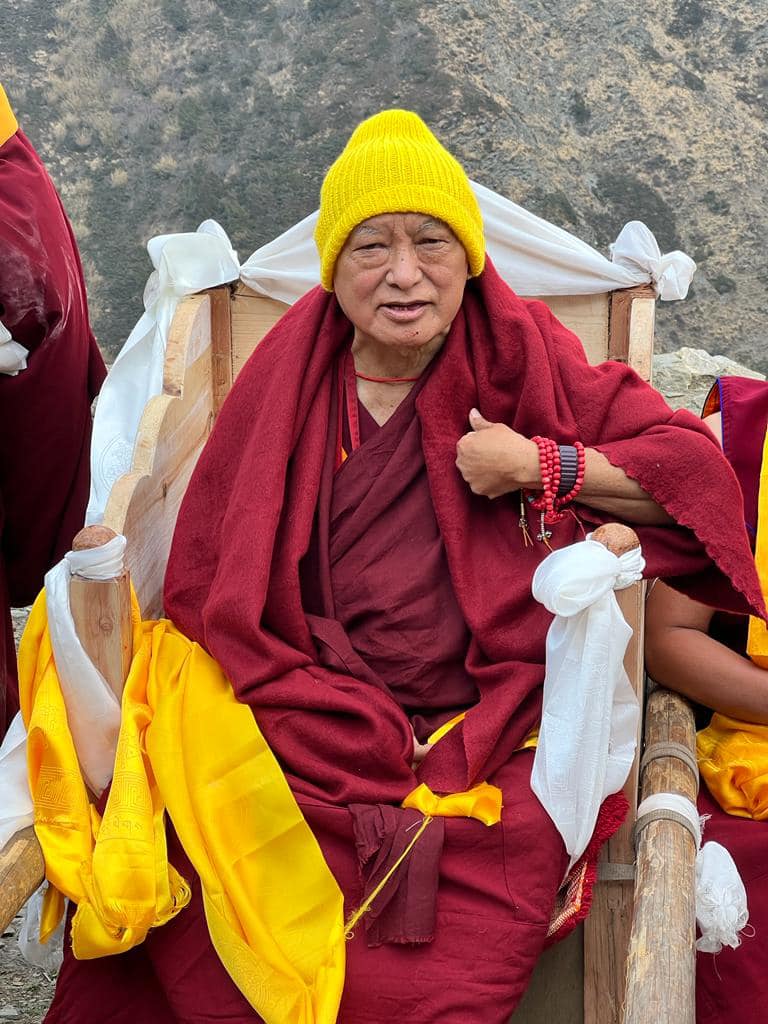
Lama Zopa Rinpoche arriving at Tsum Valley, Nepal, April 10, 2023. Photo by Ven. Roger Kunsang.
Our precious guru is sitting in meditation at Kopan Monastery.
Rinpoche had been up in the mountains in the Tsum Valley since Monday, and had to be brought down urgently as Rinpoche was experiencing altitude sickness.
On arrival back in Kathmandu this morning, Rinpoche stopped breathing. The main doctor at Karuna Hospital tried for some time to revive Rinpoche, but that was not successful. Rinpoche entered meditation at about 9.30am Nepal time, today Thursday April 13th.
His Holiness has been informed, and is giving advice.
The lama gyupas and monks are taking turns in sessions offering Cittamani Tara with Rinpoche, as advised by His Holiness. Other pujas and prayers are being offered here in Kopan.
Khadro-la has advised that this is a most important and precious time for students. Khadro-la went on to advise that the best thing for the students to do at this time is to practice bodhicitta in particular, as well as impermanence in the context of the lamrim, and then also as much as one can to help fulfil the guru’s holy wishes.
Khadro-la insisted that we should take this opportunity to try to achieve all or some of the lamrim in our own practice. Meditating and praying to the guru to receive his blessings and guidance is very important. And to try as much as possible to complete Rinpoche’s projects and holy wishes, so already to generate that wish that we’ll be able to do that.
Please pray and dedicate for Rinpoche to be reborn as quickly as possible in a place where he can be very quickly recognized and be of most benefit to sentient beings.
Please keep trying to fulfill Rinpoche’s holy wishes, especially to practice impermanence and bodhicitta in the context of the lamrim. Fulfilling the gurus’ holy wishes is a very important part of inviting the guru to return.
As you know, Rinpoche was the embodiment of bodhicitta, and always stressed the importance of remembering impermanence, and the essential need to put the teachings into practice. This is what we can do for our precious guru now – please try to follow Rinpoche’s heart advice. We can all connect with the guru and receive the guru’s blessings in this way – NOW is a very important time for this.
Our hearts are breaking, we take all our support from Rinpoche’s teachings, and the guidance of His Holiness and our teachers, and in our FPMT family.
Big love
On behalf of Ven Roger Kunsang
FPMT International Office
We will send out updates as they become available.
Foundation for the Preservation of Mahayana Tradition (FPMT), is Tibetan Buddhist organization dedicated to the transmission of the Mahayana Buddhist tradition and values worldwide through teaching, meditation and community service.
- Tagged: kopan monastery, lama zopa rinpoche final meditation, lama zopa rinpoche tsum, lama zopa rinpoche updates
12
10 Million Tara Mantras for Global Warming
FPMT centers and individuals in the USA are participating in an initiative to mitigate global warming. This group, which was concerned about the climate emergency, initiated an effort to accumulate 10 million Tara mantras dedicated to the mitigation of global warming. As of April 12, they have accumulated 10,490,279 Tara mantras!
These mantra recitations began in December 2022, and were scheduled to end in April, but the counts are now extended until May 13.
The FPMT centers participating and hosting Zoom group sessions include: Vajrapani Institute, Guhyasamaja Center, Tse Chen Ling, and Lama Yeshe Ling study group. Interested students can join group sessions or do home practices and report their counts toward the collective effort.
- Tagged: global warming, tara
7
Awakening Kindness in Children
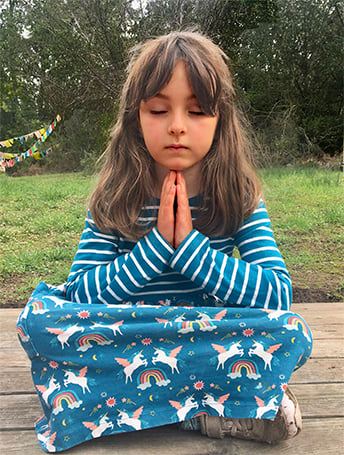
Student of Tara Redwood School. Photo courtesy of Tara Redwood School Facebook page.
Last year Pam Cayton spoke about awakening kindness and compassion in children during the 2022 Big Love Summit stressing that, “empathy is the seed that blossoms into compassion.”
Pam shared a seven step technique based on Creating Compassionate Cultures. The first step is for each child to ask, “What do I really want?” Using a simple “centering” process each child goes inside and asks deeply. From this inquiry, it emerges that we all want to feel happy and to be treated with kindness. This is the beginning of empathy, an understanding that if I want to feel happy, so do others. Then the “how” to be happy is explored and includes cultivating feeling grateful for what we have and seeing how everything we enjoy is dependent on others. Pam shares ways to help children understand that our perceptions of the world are relative; how no one can “make us angry.” Nobody makes our emotions, we are in charge of our own feelings. She also spoke about the lost art of listening and how connection and communication feels good, deepens our empathy, and fuels our compassion.
Watch Pam Cayton in, We are all Connected: https://youtu.be/cRgXUlGQvVE
fpmt.org/education/secular/universal-education-for-compassion-and-wisdom
- Tagged: children, pam cayton, tara redwood school
5
The Lawudo Chronicles: Michelle Le Dimna
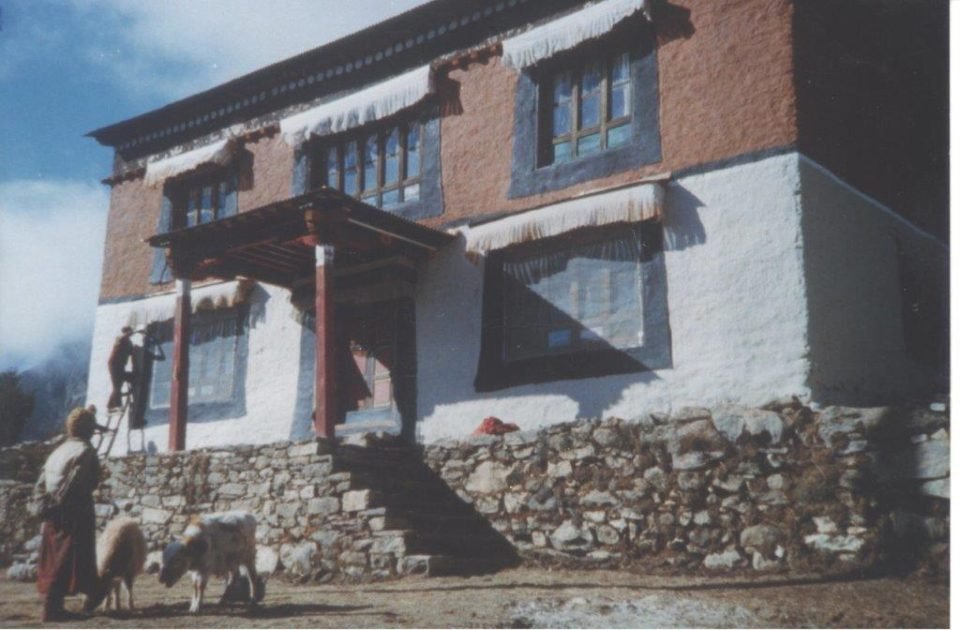
The Lawudo Temple, 1984. Photo courtesy of Michelle Le Dimna.
Michelle Le Dimna arrived in Kopan for the 1978 November course and stayed in Nepal and India following teachings and doing retreat until February 1985. Michelle has spent about 40 years translating Dharma books into French. She was instrumental in organizing relic tours in France and Belgium and helped with fundraising for the Maitreya Project.
Below is Michelle Le Dimna’s account of her visit to Solu Khumbu in 1984-1985 and her three-month winter retreat in Lawudo.
This story was first published in the Love Lawudo quarterly newsletter #5 in 2019.
Rinpoche’s Advice and the Hardships of Getting to Lawudo
After Lama [Yeshe] passed away, I had the opportunity to have a long interview with [Lama Zopa] Rinpoche. It was the first time I could really accept whatever he would tell me to do. First, he sent me to Namo Buddha for a month’s retreat, then he told me to go for a three-month retreat at Lawudo. It’s difficult nowadays to imagine a world without the internet and even without a phone. I had no idea what I would find there, and I couldn’t tell anyone in Lawudo that I was coming. So, while waiting in Kathmandu at the end of the monsoon, I prepared what I thought would be necessary for my survival: a stove and kerosene. I remember not knowing whether Ani Samten [Lama Zopa Rinpoche’s sister] would be able to cook for me.
I took a bus from Kathmandu, but it didn’t get very far because a landslide had cut the road off, so I found myself at night in a shop, looking for a porter to help me to carry my load to Lawudo. A Nepali man said he would do it. I noticed that he was wearing smart shoes, but he was the only choice I had. After one day’s walk, he asked me for his money and made his escape without any warning in the early morning. I then found a young guy in the village, with bare feet, wearing very light white clothing, who was quite poor but also quite strong. As the nights were getting cool, I started to lend him my shawl, but after a few days I noticed I had got a lot of body lice which were quite hard to get rid of! He would only eat potatoes as he wanted to save as much money as possible. As he was not a talkative or noisy one, it was really nice to walk with him, day after day. It took maybe ten days in total to reach Namche. I felt very sorry that I was not able to give him as much money as he deserved, but there were no banks there and I had to keep enough for the three months to come.
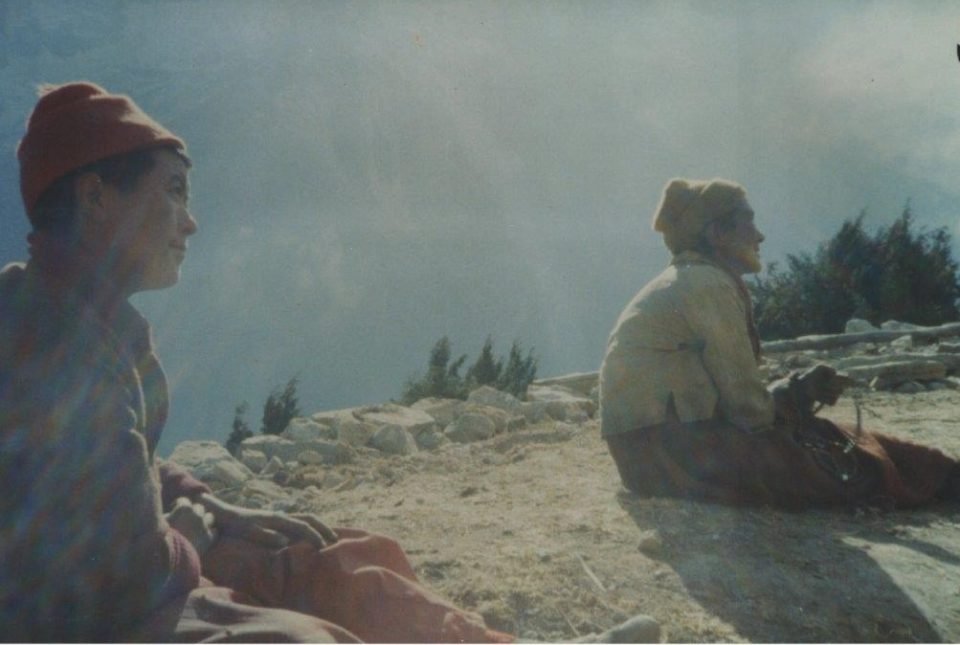
Ani Samten (Lama Zopa Rinpoche’s sister) and Amala (Lama Zopa Rinpoche’s mother), Lawudo, 1984. Photo courtesy of Michelle Le Dimna.
The Difficulties and the Joys of Being at Lawudo
I bought butter and tsampa at the Namche market—it would be my daily breakfast—but the butter was not clean and there was a lot of moisture in it. It certainly didn’t help my stomach problems and I had dysentery during my whole stay because of amoebas and other parasites. I met Ani Samten and the monk from Kopan who was helping her, at the market and we walked together to Lawudo. Ani Samten was about my age, and I considered her as a sister. The relationship was easy and warm, we could communicate with our broken English.
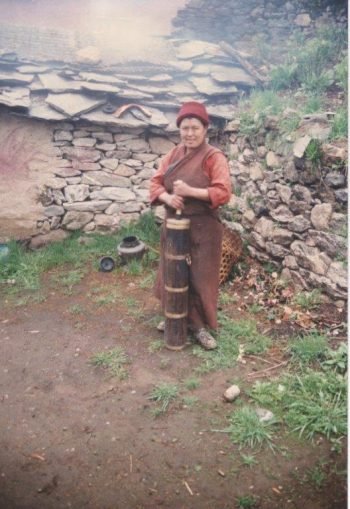
Ani Samten preparing butter tea, 1984. Photo courtesy of Michelle Le Dimna.
With Amala [Lama Zopa Rinpoche’s mother], we only had a dozen of Tibetan words to communicate in: yapodu, yapomindu, tsutiche, mambo tsutiche and so on. Anyway, she was continuously reciting loudly OM MANI PADME HUM. The only conversations we had were concerning Rinpoche. She reminded me of my mother who had to bear not having news of her daughter for so long.
I had lunch with Amala and Ani Samten every day. I enjoyed eating potatoes every day very much. I love potatoes and am very used to them because I come from Bretagne [France]. They were very tasty with erma (timut in Nepali), chili sauce, and butter, of course. The potatoes would be sliced and dried in the sun or else placed in a big hole in the ground so that they wouldn’t get frozen. Every evening I went back to the kitchen for a short while just to enjoy a tea and sit by the fireplace.
I was staying in a room just above the gompa and wearing my down jacket day and night. In December for sure, but maybe even before that, the water became frozen. The sun was hot during the day, so I don’t think I suffered from the cold. At night, sometimes I would sit outside and look at the sky. At the beginning I was very surprised to see so many shooting stars. They were very close and once I could hear the sound of a meteorite falling down very nearby. I thought I would be able to find it the next day, but it didn’t happen. It felt like magic, but actually it was simply because the meteorites were catching fire while entering into the atmosphere and the atmosphere is not far above at that altitude.
At the end of my retreat I allowed myself to tour around a bit. I had the opportunity to have a meeting with Charok Lama, using my poor words of Hindi and Tibetan! Another time, I went down to Thami, the village where Rinpoche was born. I also participated in a few pujas at the nunnery down below, which was very powerful. I am full of memories!
Remembering Death
Throughout the three months, only once did a group of trekkers visit Lawudo. Other than that, I saw no other Westerners. They were French, so we had a bit of a conversation. A week later, when Ani Samten came back from the market in Namche, she told me that one lady from this group had fallen down from the path and died. I was shocked. And it reminded me how strongly I felt the presence of death when I was preparing for my trip to Lawudo. Lama Lhundrup especially insisted very much that I should remember death at all times. He told me that Zina also went to the Himalayas for retreat, but she died up there before finishing it, so I had to be ready, he said something like that.
Dreaming of a Nice Hot Shower
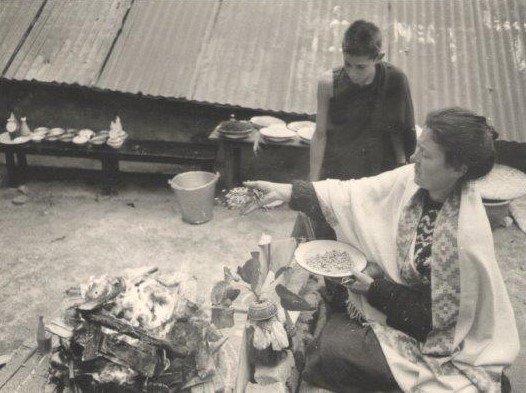
Michelle Le Dimna fire puja at Kopan Monastery at the end of her three month retreat at Lawudo, 1985. Helped by young Daja Wangchuk. Photo courtesy of Michelle Le Dimna.
When the first snowfall came, I had to think of getting back down from the mountains. Ani Samten filled up my rucksack with crushed aromatic plants such as juniper, which came to 21 kilos. But when I started to make my way back, I had so much energy that I was running all the time. It didn’t take me long to get to Kathmandu, a week if I remember well. I was in such a dirty state that on my way I was dreaming more and more of a hot shower and when I arrived at my regular hotel, The Blue Star, I went straight to the shower. I put on the soap, but either the water was cold or there was no water! Strong expectations but big laughter, rather than big disappointment. When I was back in Kopan—where I performed the fire puja—Rinpoche invited me for a Sherpa meal one-to-one as he wanted to have fresh news of his family.
So that was my experience of doing retreat at Lawudo. Years later, when I read The Lawudo Lama I realized that I had no idea of the power of the place, it was incredible! So, this is just my small story at my level. But I feel very grateful to have been given this opportunity and to have had this connection.
Please consider subscribing to the Lawudo newsletter which is published four times each year on the major holy days. For more information about Lawudo Gompa and Retreat Center, please visit the Lawudo Gompa website. You can also follow Lawudo on Facebook.
FPMT.org brings you news of Lama Zopa Rinpoche and of activities, teachings, and events from over 150 FPMT centers, projects, and services around the globe. If you like what you read, consider becoming a Friends of FPMT member, which supports our work.
- Tagged: lawudo, lawudo chronicles, michelle le drimna
28
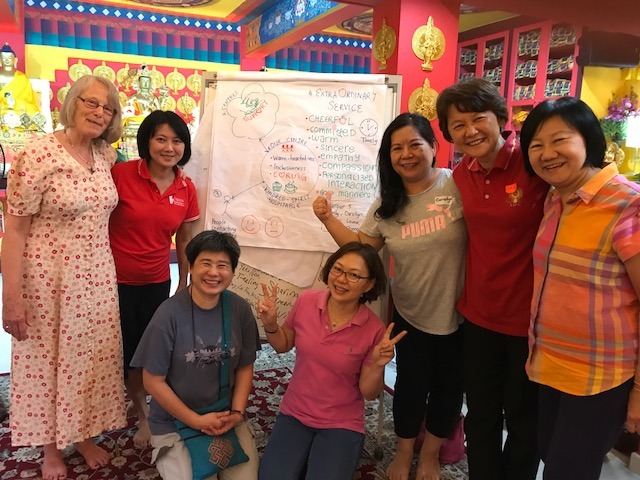
Participants with Wendy Ridley, registered facilitator, at the Foundation Service Seminar, Malaysia, 2017.
We are delighted to announce that Kopan Monastery, Nepal, will be hosting an FPMT Foundation Service Seminar (FSS) from September 21-26, 2023.
Kopan is hosting this FPMT Service Seminar following the Light of the Path Retreat with Lama Zopa Rinpoche (which is taking place September 3-17 registration for this retreat opens April 1), in order to make it easy and affordable for FPMT students to participate in both the retreat and the seminar.
Kopan Monastery is the home of the FPMT organization, and Lama Zopa Rinpoche is spending more time at Kopan in recent years, so it is very precious that Kopan is hosting a FSS right after Lama Zopa Rinpoche’s Light of the Path retreat.
The FSS is designed for those already offering service, and for anyone interested in offering service, in the FPMT organization.
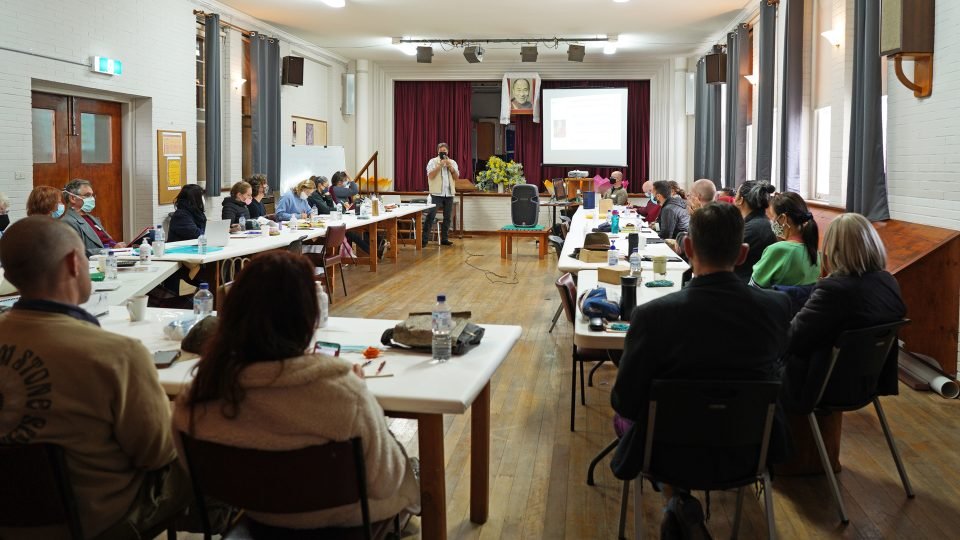
François Lecointre facilitating the Foundation Service Seminar, Tara Institute, Melbourne, Australia, May 2022. Photo courtesy of Tara Institute.
The FSS explores how one can best offer skills and develop qualities in service. It provides a firm basis to serve effectively and joyfully within the FPMT organization by developing a shared understanding of the FPMT mission and how that translates into action for centers, projects, services, study groups, and individuals. Older students and volunteers who have participated in the FSS have felt re-energized by it. The FSS is an opportunity to experience Lama Yeshe’s “family feeling” and to nourish existing and prepare future directors, SPCs, board members, registered teachers, staff and volunteers.
For more information on the Foundation Service Seminar, visit FPMT Service Seminars. You can also read more about past Foundation Service Seminars held around the world.
Lama Zopa Rinpoche is the spiritual director of the Foundation for the Preservation of Mahayana Tradition (FPMT), a Tibetan Buddhist organization dedicated to the transmission of the Mahayana Buddhist tradition and values worldwide through teaching, meditation, and community service.
- Tagged: foundation service seminar
24
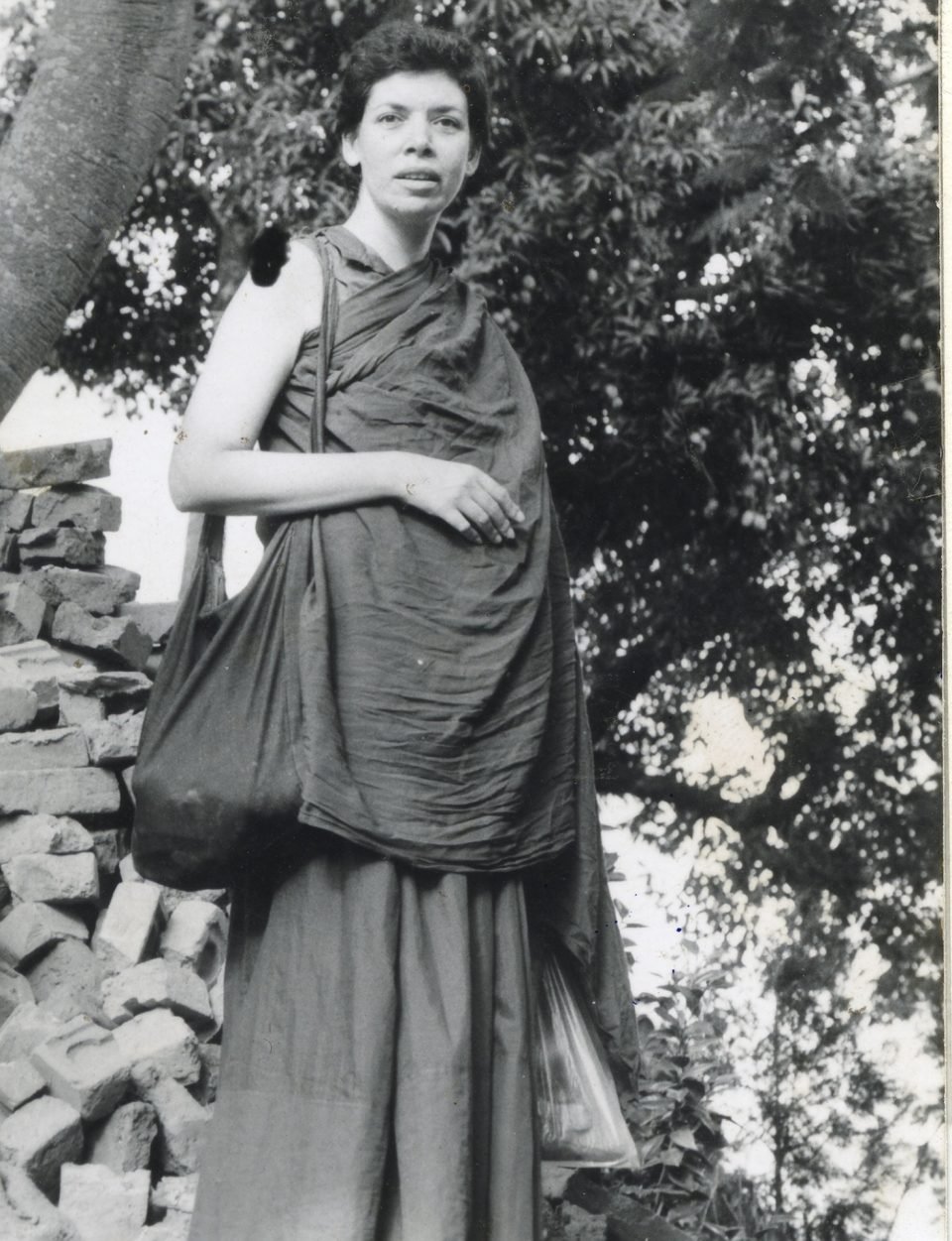
Ven. Thubten Pemo at Kopan Monastery. Year unknown, photographer unknown. Courtesy of Lama Yeshe Wisdom Archive.
Earlier this month we received the news that Ven. Thubten Pemo, ordained since 1974 and one of the first students of Lama Yeshe and Lama Zopa Rinpoche, passed away. We shared an inspiring letter she wrote to Lama Zopa Rinpoche in the late 1990’s discussing her experiences in retreat.
Please enjoy two pieces written by Ven. Pemo in 2000 for Mandala magazine and in 2006 for Sangha magazine. The first piece is about the beginning of Lama Yeshe’s work in the West; and the second is advice from Ven. Pemo about the benefits of doing retreat.
We will continue to share details of Ven. Pemo’s extraordinary life as one of the first Western students of Lama Yeshe and Lama Zopa Rinpoche.
The Beginnings of Lama Yeshe’s Work in the West
By Ven. Thubten Pemo
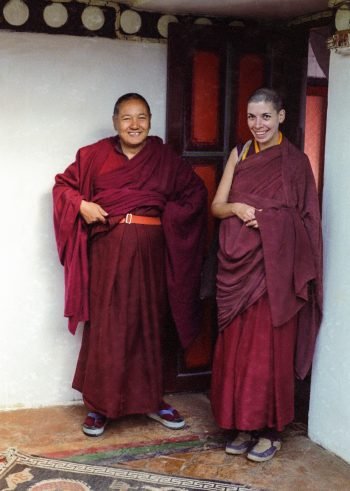
Lama Yeshe with Ven. Thubten Pemo, 1983. Photo courtesy of the Lama Yeshe Wisdom Archive. Photo courtesy of Lama Yeshe Wisdom Archive.
Last summer was the 25th anniversary of Lama Thubten Yeshe and Lama Thubten Zopa Rinpoche’s first teaching tour to the West, a tradition that has continued annually ever since. Many of us were at Kopan Monastery in Nepal, when around July 4, 1974, Lama and Rinpoche got their passports and, accompanied by Ven. Max Matthews, left on their first trip to America.
Arriving in New York City, they visited Geshe Wangyal’s center in New Jersey and then went to see their teacher, Geshe Sopa Rinpoche in Madison, Wisconsin. After that they went to Indiana to meet their student Louie-Bob Wood, where they established the first FPMT center in the West, the Bodhicitta Foundation for Developing Human Potential (which closed a year or two later).
Lama Zopa went back to Geshe Sopa in Wisconsin while Lama Yeshe visited other lamas, including Trungpa Rinpoche in Boulder, Tarthang Tulku in Berkeley, and Dezhung Rinpoche in Seattle, giving teachings in most places. The visit concluded with a weekend meditation course by both lamas in New Jersey.
The lamas returned briefly to Nepal and then headed out again, this time for their first visits to Australia and New Zealand and the first Kopan-style meditation course ever given in the West. Ven. Yeshe Khadro had gone ahead to help Tom and Kathy Vichta organize the course, which was held in Queensland. After the course, Lama was shown a piece of land nearby at Eudlo. This became Chenrezig Institute. Ven. Ann McNeil, who had accompanied the lamas to Australia, stayed behind to build the gompa and develop the center.
When the lamas returned to Kopan, we met with Rinpoche in the Kopan gompa and he told us about their first visit to the West, where Lama got to see a supermarket for the first time. In his teachings, Lama often used to use supermarkets as examples of excess; now he finally got to see one. The students also took the lamas to Macy’s in Manhattan so that they could see a big department store. Rinpoche told us how they looked for something to buy. “So I bought a belt,” he said. He bought a belt to hold up his shemdap (lower robe).
In the early 1970s, Kathmandu and India were quite primitive and did not have big supermarkets or nice modern things to buy. Kopan had neither electricity nor toilets. The motor roads were unpaved.
I was talking with Lama Yeshe before he left Kopan for America and told him about all the good food in the West, especially the cheese. At that time, you couldn’t get good cheese in Kathmandu, and Lama acted like he really liked cheese, like finally he and Rinpoche would get to eat some good food. Then, after acting interested, Lama looked at me and said, “I don’t care about cheese.”
These words had a big effect in my mind. I suddenly understood that the lamas were not going to the West with any interest in obtaining worldly happiness from good quality objects or sense pleasures. Lama did not care about that at all. All Lama cared about was bringing Dharma to the West and benefiting sentient beings.
At the same time, 26 years ago, Lama Yeshe started the International Mahayana Institute for his monks and nuns. In 1974, there were 15 Western monks and nuns at Kopan. Publishing began around the same time. One of our first publications was The Wish-Fulfilling Golden Sun of the Mahayana Thought Training, Rinpoche’s lam-rim textbook, which we used at the early Kopan courses. It was written down and edited by Nick Ribush and typed by me. I typed seven days a week. Each day, I began typing after breakfast and typed until 2 a.m. Then I would close the typewriter and go to my room to read prayers, recite mantras and so forth. I’d go to sleep at 4. I did this seven days a week. This was how I spent my first year as a nun.
Dr. Nick also published transcripts of Rinpoche’s Kopan course teachings. The teachings from the third, fourth and fifth courses were typed from handwritten notes and those from the sixth course from Sally Barraud’s shorthand and rudimentary cassette tapes. There was no tape recorder at Kopan in the very early days. Then I brought one back from New York and from then on we taped all the lamas’ teachings on it. I used to type most of the books, prayers, sadhanas and commentaries that we published onto wax stencils, and then we’d print them on a Gestetner duplicating machine that Lama had allowed us to buy in Kathmandu. The Kopan monks also used it for their Tibetan texts.
Within a few years this fledgling attempt at publishing the Dharma had a name, Publications for Wisdom Culture. Eventually, it grew into Wisdom Publications as well as, more recently, the Lama Yeshe Wisdom Archive. These days, the Archive is much more technologically advanced than it was at the beginning, with my portable tape recorder, weird cassettes, no electricity, almost dead batteries and prehistoric manual typewriters.
Interestingly enough, Wisdom’s first professionally published book, Wisdom Energy, contained the lamas’ teachings from the American tour of 1974, their first in the West.
So, 1999 was the 25th anniversary of that first trip to the West, and it also marked the beginnings of the FPMT as an international organization. Never in our wildest dreams would any of us back there at Kopan in 1974 have ever imagined that, before the end of the century, Lama and Rinpoche’s activities would grow to comprise more than 120 centers all over the world.
Actually, I have just received the latest issue of Mandala in the mail. Reading the news from all the FPMT centers, I cried, it was so overwhelming. In their world tours these past 26 years, Lama Yeshe and Lama Zopa Rinpoche have done an unbelievable amount of work to bring the Dharma to people everywhere on earth. Reading about the Dharma activities of all the students connected to our centers is so incredible and amazing that I don’t have words to describe it.
In the summer of 1974, our lamas planted a small seed. That small seed has grown into a huge bodhi tree that gives shelter and nourishment to thousands and thousands of people all over the world. This is another benefit of bodhicitta, the bodhicitta of our gurus, and the virtuous thoughts of the thousands of people who have met Lama Yeshe and Lama Zopa Rinpoche and given their lives to carrying out their holy wishes. No words can describe how great this is.
Lama Yeshe created many “golden flower students.” Thank you, Lama.
See you in the sky (as Lama would say).
Originally published in Mandala, March-April 2000.
The Benefits of Doing Retreat
By Ven. Thubten Pemo
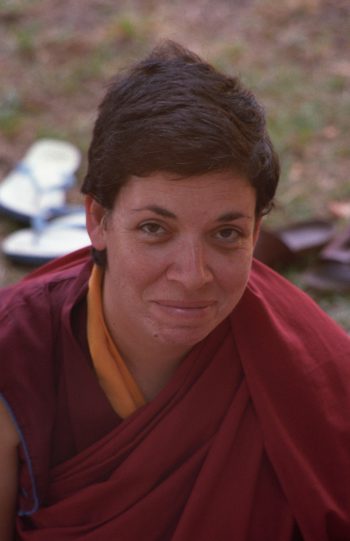
Ven. Thubten Pemo, Maitreya Instituut, Maasbommel, The Netherlands, 1986. Photo by Jan-Paul Kool. Photo courtesy of Lama Yeshe Wisdom Archive.
The benefit of doing retreat is that one becomes a better person. A good human being. A good member of human society. One becomes better than one was before, gradually, one gives up any thoughts or wishes to give harm to other living beings. One helps, serves and benefits others with one’s body, speech, and mind.
The benefit of doing retreat is that one becomes more warm-hearted, more loving, gentle, generous, open-hearted, compassionate, patient and genuinely nice. A nice person. One becomes kind.
For more than thirty years I have listened to Buddhist teachings and attempted to understand them. In this retreat house I decided that the most important thing in our lives is kindness. To be kind. To everyone we meet. All the time. Everyone appreciates kindness. Everyone wants to receive kindness from us. Kindness is the meaning of life. Loving kindness. Compassion. Bodhicitta. These are the meaning and purpose of our human life.
His Holiness the Dalai Lama has said, “My religion is kindness.” Buddhism has thousands of teachings. His Holiness has condensed all these teachings into one word kindness. One word with vast meaning. To be kind is our life’s work, to WANT to be kind, to cultivate kindness, to express our loving-kindness when we interact with others. With eyes of loving-kindness to gaze upon another sentient being. To act with loving-kindness all the time. Cultivating this attitude of loving-kindness is the benefit of doing retreat.
I have known teachers who have this quality. When listening to oral teachings from a teacher whose voice was the sound of great kindness, merely to hear his voice brought tears to my eyes. I have seen holy teachers whose face was compassion. Their facial expressions cause my heart to explode.
The benefit of doing retreat is that one wants to become like one’s teachers and all the Holy Beings. One is inspired to practice Dharma. And one inspires others to practice Dharma. They also want to do retreat some day.
The benefit of doing retreat is that the practices purify one’s negative karma and accumulate vast merits. One is liberated from experiencing countless future sufferings. Every day one becomes closer to Enlightenment.
The benefit of doing retreat is that it gives one time to think about and understand the oral teachings one has heard the books one has read. Away from one’s busy life, one’s job, family and friends, one has more quiet, peaceful time for oneself, time to contemplate and study. Time to put into practice the teachings that one has received from one’s precious teachers, time to learn about oneself. Time to clearly see one’s thoughts and motivations.
The benefit of doing retreat is that one sees who one’s own mind creates problems and suffering. It appears to come from outside of oneself. Suffering happens because of the way one thinks. One makes oneself unhappy.
The benefit of doing retreat is that one has time alone to recognize one’s own mistakes and faults, and to correct them. By correcting one’s own mistakes and faults, one becomes a better person. In each year one is a little bit better than one was before. There is some improvement and other people notice the one has changed and is “better than before.” One has some good qualities that actually inspire other people to practice Dharma and attempt to meditate.
The benefit of doing retreat is that one has time to meditate on Bodhicitta, for the benefit of all sentient beings. To become a Buddha for them. Oneself cultivates the attitude of working for others, serving others, cherishing others, for them, to benefit them. For their happiness and freedom from suffering, oneself is practicing the path, one’s mind becomes closer to Bodhicitta, the mind of Enlightenment.
The benefit of doing retreat is that one puts effort into becoming less selfish. One meditates on the disadvantages and shortcoming of cherishing oneself. One meditates on the benefit of cherishing others. With a brave mind, with courage, one begins to decide, to want to cherish others more than oneself. Slowly one changes one’s attitude from cherishing oneself to cherishing others. Caring for others. Taking care of others.
Caring if other sentient beings are happy or sad. One is creating the causes of future suffering or of happiness. Caring if sentient beings are circling within the six realms of samsara or are free. One generates loving-compassionate concern for others and determination to help them in every way – to give them everything they need until they are Enlightened.
The benefit of doing retreat is that one sees clearly one’s mental afflictions and works to overcome them. One works are lessening and abandoning, overcoming one’s attachment, anger, hatred, pride, jealousy, ignorance and so forth.
Before one was following the mental afflictions and allowing them to continue and increase. Even being happy when one’s affliction arises – as if it is something “good” for oneself.
In retreat, one applies antidotes to these harmful mental afflictions. One works hard to overcome them. When the antidotes are effective, one’s mind becomes more peaceful. It is not easy to overcome one’s mental afflictions – they go away and then they return. They are sneaky and tricky. Difficult to recognize and to overcome.
The benefit of doing retreat is that gradually, slowly one’s wisdom increases. One sees one’s fantasies. One sees the hallucinations that one’s mind creates. One begins to recognize the hallucination AS hallucination, instead of as true, as real. This brings some peace to one’s poor exhausted mind.
The benefit of doing retreat is that it gives one time to develop one’s positive qualities. Virtuous thoughts give one more happiness and less suffering in life. One experiences mental happiness that is not dependent upon sense pleasures, not dependent upon something “good” happening to oneself.
The benefit of doing retreat is that sometimes one experiences satisfaction and contentment. Less desire. Less craving. Less attachment. Less agitation. One becomes less “freaked out” and disturbed by things, people, places, and so forth.
The benefit of doing retreat is that one begins to get SOME little bit of control over one’s wild mind. The mind which runs everywhere – searching for happiness. Trying to avoid whatever is unpleasant. A pleasure and pain that is somewhere outside of oneself.
The benefit of doing retreat is to being to find happiness within oneself. Inner Joy – Joy and happiness that are there. Somewhere. One did not experience it before. It was difficult to find happiness amidst all the suffering, amidst all the garbage of one’s own mind.
There is some joy and happiness from within and one KNOWS that it is possible for one’s own mind to experience every happiness from the smallest, up to the greatest bliss of full Enlightenment. It is possible for one to practice the teachings that lead to this.
One’s Holy teachers have practiced this path. And oneself can do it, too. With Bodhicitta. For the benefit of all the kind mother sentient beings.
The ultimate benefit of doing retreat is that oneself becomes a Fully Enlightened Buddha. Equal in realizations with all other Buddhas, guiding numberless sentient beings to Enlightenment. With countless emanations to benefit sentient beings. To attain that noble goal, it takes many lifetimes of study and meditation. It is unbelievable hard work.
In the meantime, one can be Kind.
Written by Ven. Thubten Pemo at Land of Calm Abiding. August, 2006.
Ven. Thubten Pemo, a New Yorker, was among the first students of Lama Thubten Yeshe and Lama Zopa Rinpoche. Ordained by Kyabje Ling Rinpoche in 1974, she spent most of the time since then studying and practicing in India. Holder of a mystical mirror-reading divination lineage and renowned for her wish-fulfilling jola (a type of bag often carried by monks and nuns). Ven. Pemo passed away in March 2023 in California, USA.
- Home
- News/Media
- Study & Practice
- About FPMT Education Services
- Latest News
- Programs
- New to Buddhism?
- Buddhist Mind Science: Activating Your Potential
- Heart Advice for Death and Dying
- Discovering Buddhism
- Living in the Path
- Exploring Buddhism
- FPMT Basic Program
- FPMT Masters Program
- FPMT In-Depth Meditation Training
- Maitripa College
- Lotsawa Rinchen Zangpo Translator Program
- Universal Education for Compassion & Wisdom
- Online Learning Center
- Prayers & Practice Materials
- Overview of Prayers & Practices
- Full Catalogue of Prayers & Practice Materials
- Explore Popular Topics
- Benefiting Animals
- Chenrezig Resources
- Death & Dying Resources
- Lama Chopa (Guru Puja)
- Lama Zopa Rinpoche: Compendium of Precious Instructions
- Lama Zopa Rinpoche: Life Practice Advice
- Lama Zopa Rinpoche Practice Series
- Lamrim Resources
- Mantras
- Prayer Book Updates
- Purification Practices
- Sutras
- Thought Transformation (Lojong)
- Audio Materials
- Dharma Dates – Tibetan Calendar
- Translation Services
- Publishing Services
- Teachings and Advice
- Find Teachings and Advice
- Lama Zopa Rinpoche Advice Page
- Lama Zopa Rinpoche: Compendium of Precious Instructions
- Lama Zopa Rinpoche Video Teachings
- ༧སྐྱབས་རྗེ་བཟོད་པ་རིན་པོ་ཆེ་མཆོག་ནས་སྩལ་བའི་བཀའ་སློབ་བརྙན་འཕྲིན།
- Podcasts
- Lama Yeshe Wisdom Archive
- Buddhism FAQ
- Dharma for Young People
- Resources on Holy Objects
- Ways to Offer Support
- Centers
- Affiliates Area
- Teachers
- Projects
- Charitable Projects
- Make a Donation
- Applying for Grants
- News about Projects
- Other Projects within FPMT
- Support International Office
- Projects Photo Galleries
- Give Where Most Needed
- FPMT
- Shop
Translate*
*powered by Google TranslateTranslation of pages on fpmt.org is performed by Google Translate, a third party service which FPMT has no control over. The service provides automated computer translations that are only an approximation of the websites' original content. The translations should not be considered exact and only used as a rough guide.Karma is your experiences of body and mind. The word itself is Sanskrit; it means cause and effect. Your experiences of mental and physical happiness are the effects of certain causes, but those effects themselves become the cause of future results. One action produces a reaction; that is karma.







